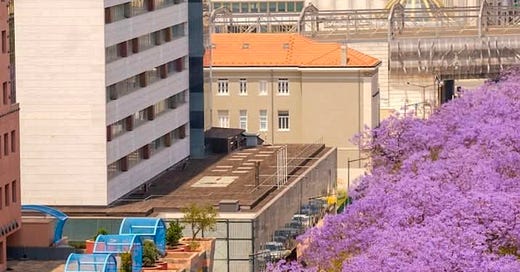Public outcry over jacaranda tree removal in Lisbon
A petition against the removal of forty-seven jacaranda trees on Lisbon’s Avenida 5 de Outubro to make way for a parking lot has garnered over 46,000 signatures.
A decision by Lisbon’s City Council to remove 25 jacaranda trees and transplant 22 others along Avenida 5 de Outubro for the construction of an underground parking lot has sparked widespread outrage among residents.
The move, which began on Thursday, has led to a surge of protests and a petition titled “No to the Removal of Jacarandas on Av. 5 de Outubro”, which has already gathered over 50,000 signatures.
The petition, addressed to Lisbon’s mayor, Carlos Moedas (PSD), city councilors, and local authorities, demands greater transparency and alternative solutions to preserve the iconic trees.
Residents claim they were only informed of the plan two weeks ago when notices were tied to the trees, stating they would be removed due to “urban development and lack of viability for transplantation.”
Pedro Franco, a local resident and the first signatory of the petition, told PÚBLICO that the council’s communication was inadequate.
“That single A4 notice tied to a tree was, believe it or not, the best way the CML found to inform its citizens that dozens of jacarandas in their street would be removed,” the petition states.
Green party PAN tries to halt operation
Meanwhile, the PAN (People-Animals-Nature party) announced that it would proceed with an injunction to stop Lisbon City Council’s jacaranda removal and transplanting operations.
The announcement was made by PAN leader Inês de Sousa Real in statements to journalists on Avenida 5 de Outubro in Lisbon, standing next to the first jacaranda tree removed by the municipal council.
Inês de Sousa Real explained that the party would file the injunction today to “immediately halt the cutting and transplanting of these trees” and to “promote public consultation and find an alternative.”
The PAN leader argued that the country “has serious commitments to protecting biodiversity” and that, although jacarandas are not protected species, “they are part of the city’s identity” and have a “landscaping role in the urban tree canopy that must be preserved.”
Although operations are already underway, Sousa Real believes the injunction can still stop the work from continuing, emphasizing that this is an "urgent process" and that Lisbon City Council, after receiving the request, will have to wait for the court's decision.
“In fact, the only reason we hadn’t filed the injunction earlier was because Carlos Moedas said he would listen to the citizens. This is a clear disrespect for democracy. To say you will listen to the citizens and then cut down the trees beforehand demonstrates an arrogance and abuse of power that is absolutely unacceptable in a democracy,” she added.
Some supporters of the cause at the scene placed a poster on the first jacaranda tree targeted by the council’s work, featuring the face of Lisbon Mayor Carlos Moedas with the message: “Wanted for environmental crime. Reward: a city with more biodiversity.”
City Council’s Justification
The council’s official documents confirm that the removals are necessary for the construction of the Entrecampos Public Parking Lot (PEPE), part of a larger urban renewal project on the former Feira Popular (Popular Fair) site.
Mayor Moedas defended the plan in a social media post, stating that the project would ultimately “double the number of trees in the area” and improve green spaces, pedestrian pathways, and cycling routes.
According to a March 2025 council report, 77 trees will be affected—25 removed and 22 transplanted.
After completion, 118 new trees will be planted, including 69 jacarandas, though the total number of jacarandas will still be lower than before.
The description emphasizes that the parking lot will be exclusively for public use and will help reduce surface parking on Avenida 5 de Outubro.
Additionally, the city claims the project will enhance green spaces, improve public spaces, and expand pedestrian and cycling paths.
The project is expected to be completed by 2027.
The document also highlights an increase in green and permeable spaces, with over 30 new species of shrubs and herbaceous plants and 3,500 square meters of new pedestrian walkways.
Most transplanted trees will remain within the Avenidas Novas parish limits, relocated to areas such as Campo Grande, Rua Alfredo Cortês, and Avenida Santos Dumont.
The city’s Department of Environment, Green Structure, Climate, and Energy assures that a specialized company will handle the transplantation and that any unsuccessful transplants will be replaced or compensated monetarily under the Granada Standard.
Residents Unconvinced
Despite these assurances, critics accuse the council of “greenwashing.” Franco argues that the math doesn’t add up: “If 25 trees are being removed, compensation should be at least 50 new trees, not 41.”
Activists are now organizing a protest, and the petition will be formally delivered to the Lisbon Municipal Assembly today.
Meanwhile, political opposition is growing. The Ecologist Party “Os Verdes” has submitted a formal inquiry to the council, while Livre councilor Patrícia Gonçalves recalled that her party had opposed the zoning changes in 2024 that allowed the tree removals.
A History of Conflict
This is not the first time the jacarandas have been at the center of controversy. In 2024, an underground parking access point was relocated to save some trees, but the current plan has reignited tensions.
To address the backlash over the decision, Lisbon City Council announced that it will hold two public information sessions open to residents.
“The best way to respond to the petition is to open our doors, provide information, and clarify doubts,” said a council representative. The two public presentations will take place this Friday, March 28, at 6 p.m., and next Wednesday at 5:30 p.m., both at the Lisbon Urban Information Center.
“The jacaranda is our identity, our heritage. Under this administration, we are saving jacarandas. We are protecting jacarandas,” stressed the councilor for Urban Planning.





